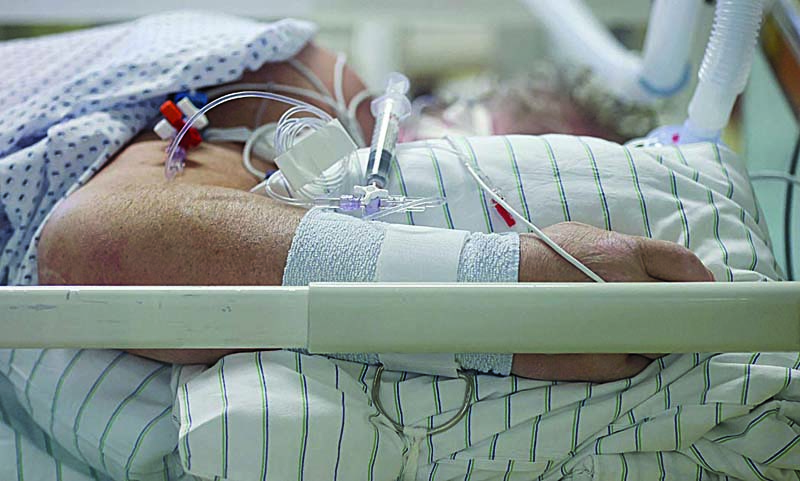 MAGDEBURG: File photo shows a COVID patient gets treatment in the COVID-19 intensive care unit of the community hospital (Klinikum Magdeburg) in Magdeburg, eastern Germany, amid the coronavirus COVID-19 pandemic. – AFP
MAGDEBURG: File photo shows a COVID patient gets treatment in the COVID-19 intensive care unit of the community hospital (Klinikum Magdeburg) in Magdeburg, eastern Germany, amid the coronavirus COVID-19 pandemic. – AFP
BERLIN: Germany announced record coronavirus fatalities and infections yesterday as its total death toll passed 100,000, with its most severe virus wave yet swelling just as a new government prepares to replace Angela Merkel's coalition. Germany weathered earlier bouts of the pandemic better than many other European countries, but has seen a recent resurgence, with intensive care beds rapidly filling up. Europe's largest economy recorded 351 COVID fatalities in the past 24 hours, bringing the official death toll since the start of the pandemic to 100,119, in what Bild daily called a "grim milestone".
The weekly incidence rate also hit an all-time high of 419.7 new infections per 100,000 people, according to figures from the Robert Koch Institute health agency. The escalating health crisis poses an immediate challenge to the new centre-left-led coalition government set to take over from Merkel's cabinet next month. The country has been stuck in political limbo since the September 26 general election, with the popular former scientist Merkel governing only in a caretaker capacity.
'Thousands dying daily'
Merkel's presumed successor Olaf Scholz began a presentation of his new government's policy roadmap Wednesday by announcing new measures to tame the fourth wave. These included forming a corona response task force based at his office and earmarking one billion euros ($1.12 billion) in bonuses for overstretched health workers on the front lines of the pandemic.
However, those steps and nationwide restrictions announced last week to limit the unvaccinated from participating in public life have been criticised as far too little and too late. "The latest decisions are like announcing in a flooding catastrophe a plan to hire more swimming teachers and distributing a few water wings and rubber ducks," Sueddeutsche newspaper fumed. "The coalition has big plans, but what use are they if we are all locked down over Christmas with thousands dying each day? The new government would be well advised to throw everything it has for now at tackling the pandemic."
The spike in Germany comes as Europe has re-emerged as the pandemic's epicentre, with the continent battling sluggish vaccine uptake in some nations, the highly contagious Delta variant, colder weather sending people indoors and the easing of restrictions. Last week, more than 2.5 million cases and almost 30,000 COVID-related deaths were recorded in Europe, making it by far the region currently worst hit by the virus, according to AFP's tally.
'Acute overload'
Meanwhile, the German health sector has had to call on hospitals elsewhere in the EU for help. Some clinics are already facing an "acute overload" that has made it necessary to transfer COVID-19 patients abroad, according to Gernot Marx, head of the German Interdisciplinary Association for Intensive Care and Emergency Medicine.
Germany last week began requiring people to prove they are vaccinated, have recovered from COVID-19 or have recently tested negative for the virus before they can travel on public transport or enter workplaces. Several of the worst-hit areas have gone further, cancelling large events like Christmas markets and barring the unvaccinated from bars, gyms and leisure facilities.
The surge has ignited a fierce debate about whether to follow Austria's example and make vaccination mandatory for all citizens. Scholz has voiced support for compulsory vaccinations for health staff, and said that his government would "do everything necessary to bring our country safely through this time".
Earlier this week, Merkel, who is retiring from politics after four terms, summoned the new alliance's top brass for emergency talks. Germany's COVID-19 crisis has in part been blamed on its relatively low vaccination rate of about 69 percent, compared to other Western European countries such as France, where it is 75 percent. The country has urged all inoculated adults to get a booster to combat waning efficacy after six months, but that campaign has also been marred by supply and logistics snags. - AFP




